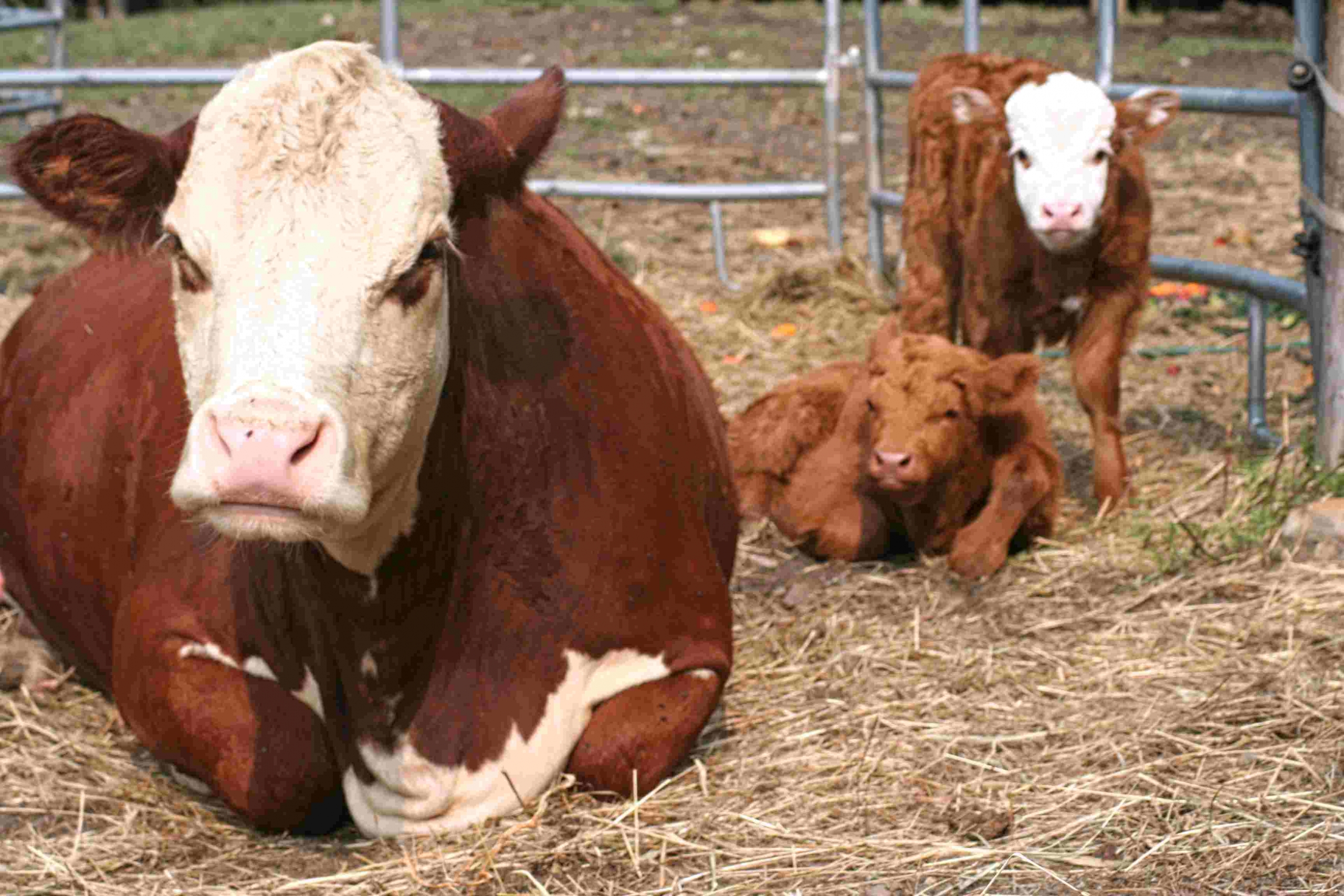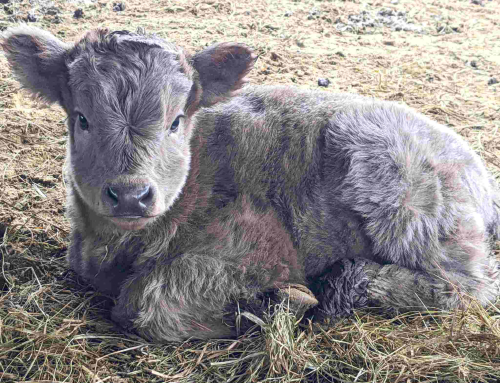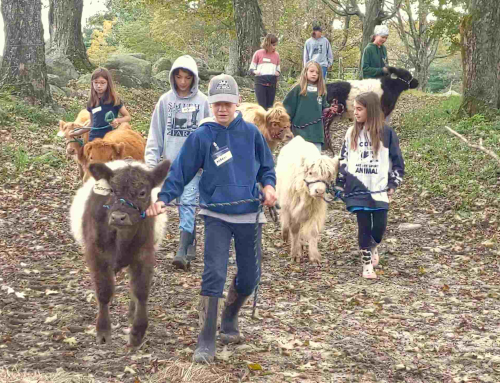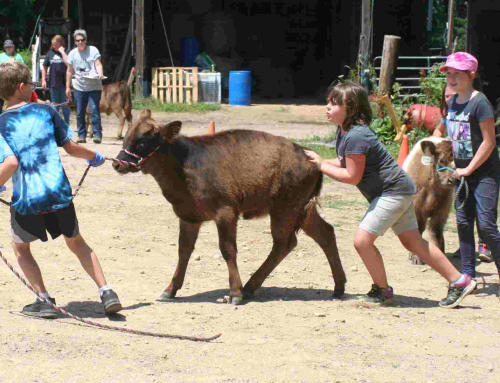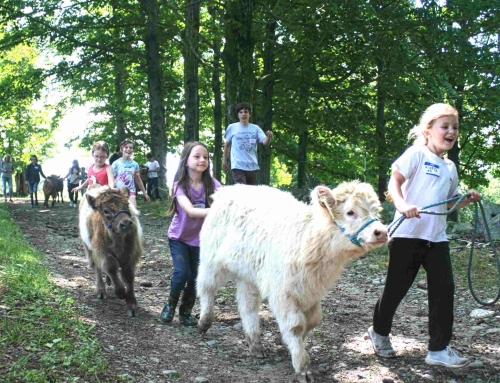Last week, two more calves were born — late in the year for Miles Smith Farm. We like our calves born in April or May, so how did we end up with September calves? We bought them. In January, we rented out Washington, one of our Scottish Highlander bulls, to Tyler, a farmer who wanted to breed his Hereford cows. Six months later, Tyler sold his pregnant cows to me.
The Herefords are a mother-daughter pair; Keeper, and her daughter Rose. Both were huge, maybe 1,500 pounds, and gentle; Keeper more so than Rose. Keeper lets us scratch her back and lead her with a halter; Rose allows us to touch her, but sometimes runs off if we get too close.
Hamish, The Mooching Calf
As happens with most pregnant cows, about two weeks before giving birth, both cows’ udders swelled with milk. They were pastured with a herd of Scottish Highlanders that included cows with nursing calves. Calves are always hungry and can be opportunists. One calf named Hamish, enticed by Keeper’s massive teats, decided to nurse on Keeper-who let her! Hamish was a moocher, and Keeper was a willing “milk machine.”
This is wrong because a newborn needs the colostrum provided in milk during the first 24 hours of nursing to provide immunity from disease. If Hamish emptied Keeper’s udders, she’d get the colostrum (which she didn’t need), and the calf would miss out when it was born. To keep Hamish from mooching, we separated both Keeper and Rose from the herd.
Moe, The Bull Calf
On Sept. 9, Keeper gave birth to a red bull-calf that looked more like his Highlander dad than his mom. The calf, named Moe, nursed immediately, got his colostrum, and seemed healthy until the next day when Luna, his sister/niece/cousin, was born.
Unlike Moe, Luna (Rose’s calf) has a white face, black rings around her eyes, and a white tail tip. She looks like her Hereford mother, not like her Highlander dad. She was a spunky little girl right from the start. The day she was born, after filling up on milk, she ran and bounced circles around her mom, while Moe watched. This little heifer was a fireball, while Moe was enervated.
This Could Be A Problem
We didn’t notice at first, but after she emptied Rose’s udder, she latched on to Keeper’s teats and a consenting Keeper, let her nurse. It seemed that Keeper liked this little girl better than her calf. Poor Moe lay in the corner of the holding pen, ignored by both moms.
Once we realized the problem, we separated the moms and babies; Keeper and Moe in one stall and Rose and her calf in another. By then, Moe was lethargic and not interested in nursing. I hand-milked Keeper and tried to bottle feed him with her milk, but his “sucking instinct” was gone. This was serious. Were his feelings hurt? Was he jealous of his sister for winning his mother’s heart? Would he live?
How I Saved Moe’s Life
We’ve had other calves that would not nurse, but not like this. Moe had initially nursed but then lost interest. I’d never seen this before, but I knew he needed a boost. We have a calf tube feeder, a device with a hard plastic tube attached to a bag designed to deliver liquids directly into a calf’s stomach. After viewing three instructional YouTube videos, I felt confident I could insert it down his throat (avoiding his windpipe) into his stomach. One of the videos suggested feeding electrolytes to give an energy boost and help with digestion. I inserted the tube into his stomach with my friend Trish’s help and administered a liter of electrolytes. It worked!
Two hours later, he nuzzled his mom’s udders and latched on for a long drink. To be sure Moe gets enough nourishment, the pairs are separated at night and put them together during the day. After a few days, it seems that Keeper has finally bonded with Moe, and while the heifer may always try to mooch, Moe is now first with his mom. He’s perked up quite a bit and now has the energy to bounce, run around, and thrive.
Want To Visit Moe?
If you want to see how he is doing, you can visit Moe at Miles Smith Farm on Friday and Saturday, Sept. 25 and 26. Because of Covid-19 concerns, you’ll need to make an appointment. You and our child can also ride a cow, walk a calf, snuggle a bunny, pet a goat, or brush a donkey.
Carole Soule is co-owner of Miles Smith Farm (www.milessmithfarm.com), where she raises and sells pastured pork, lamb, eggs and grassfed beef. She can be reached at cas@milessmithfarm.com.



